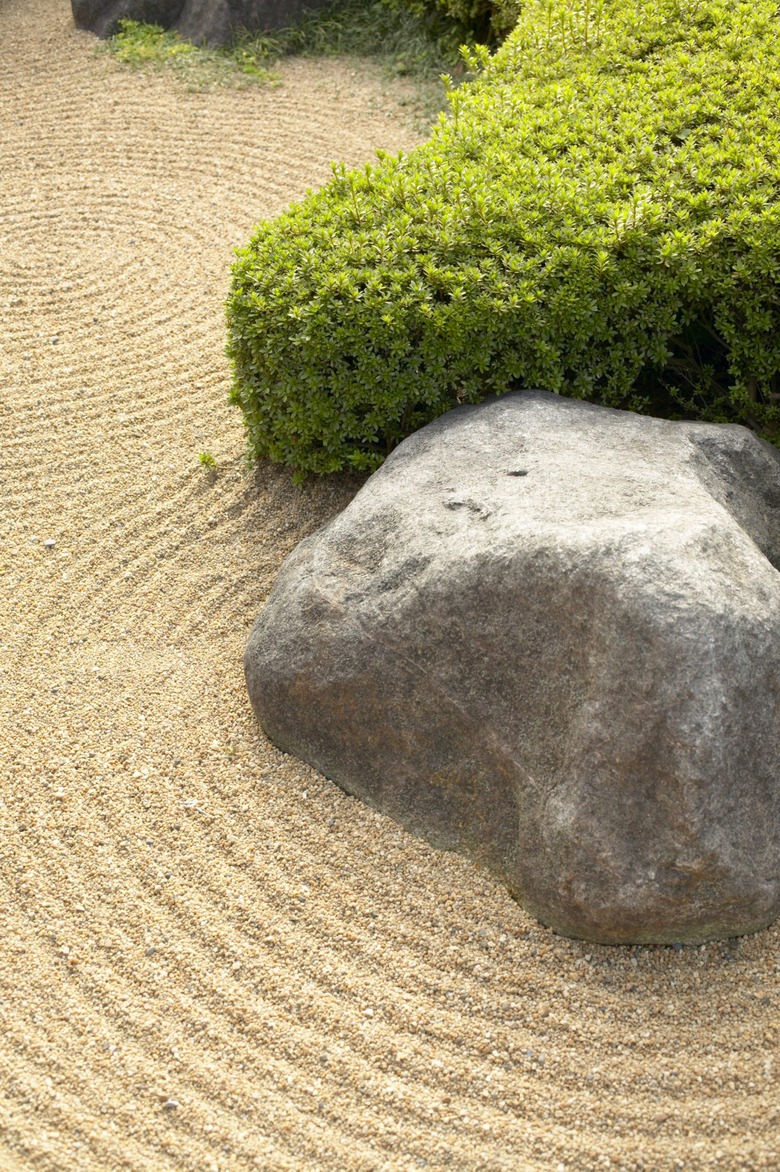How To Rid Grass From Growing In Gravel
After spending the time and money creating gravel pathways or islands in your landscaping, the last thing you want to see is grass growing in between the small rocks. Chemical herbicides, such as those containing glyphosate, are sprayed on the errant grass blades and can kill them within a day or two. However, if you don't want dangerous chemicals outside where your kids play, there are natural alternatives to get rid of the grass poking through your garden gravel using items you likely already have in your kitchen.
Step 1
Step 1
Pour regular table salt over the grass in the gravel areas and water it in. Salt is a dessicant, which means it absorbs water. When it touches the grass blades, it removes some of the plant's moisture. Near the roots, it absorbs the moisture that roots need to keep the grass hydrated, quickly killing the grass. Salt tends to stay in the soil, keeping grass from growing back in the same location — not only does it kill existing grass, but it helps keep your gravel areas grass-free for years. The problem with salt is that if the water, or later rainfall, helps it travel to plants surrounding your gravel area, it can kill those plants as well. To be safe, keep the salt well away from plants you want to keep.
- After spending the time and money creating gravel pathways or islands in your landscaping, the last thing you want to see is grass growing in between the small rocks.
- Salt tends to stay in the soil, keeping grass from growing back in the same location — not only does it kill existing grass, but it helps keep your gravel areas grass-free for years.
Step 2
Step 2
Heat water to boiling and pour it over the unwanted grass. Boiling water damages plants basically the same way it hurts you. It burns your skin — which is a good reason to wear rubber gloves, long sleeves, long pants and closed-toe shoes when using it as a grass killer — and it burns the outer coating on the grass blades. If the grass roots are shallow enough, they also get burned by the hot water. The blades shrivel and die almost immediately, which means the grass can't turn sunlight into nutrients. Ensure your kids don't help you with this step so that they don't get splashed or burned. This burns all plants it touches, so keep it focused on the grass.
- Heat water to boiling and pour it over the unwanted grass.
- This burns all plants it touches, so keep it focused on the grass.
Step 3
Step 3
Fill a spray bottle with white distilled vinegar or apple cider vinegar and spray the grass growing through your gravel on a sunny day. Vinegar contains acetic acid, which burns the plant. The vinegar multiplies the power of sunlight, increasing the burn when applied on sunny days. Pickling vinegar contains a stronger concentration of acetic acid — 9 percent instead of distilled vinegar's 5 percent — so it creates a stronger solution. Like salt and boiling water, vinegar isn't selective; it will kill any plant it touches, so spray carefully.
Step 4
Step 4
Combine boiling water with salt or vinegar for a powerful grass-killing mixture. Mix 1 cup of salt in 2 cups of boiling water or equal parts of boiling water and vinegar. This provides the instant wilting effect of the hot water with the properties of the salt or vinegar.
- Fill a spray bottle with white distilled vinegar or apple cider vinegar and spray the grass growing through your gravel on a sunny day.
- Like salt and boiling water, vinegar isn't selective; it will kill any plant it touches, so spray carefully.
Tip
Adding more gravel when necessary for complete soil coverage helps keep unwanted grass at bay. Without proper sunlight, grass seeds can't germinate and spreading rhizomes can't sprout.
Things Needed
- Salt
- Boiling water
- Rubber gloves and protective clothing
- Distilled vinegar
- Apple cider vinegar
- Pickling vinegar
- Spray bottle
